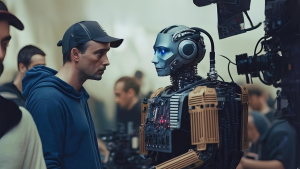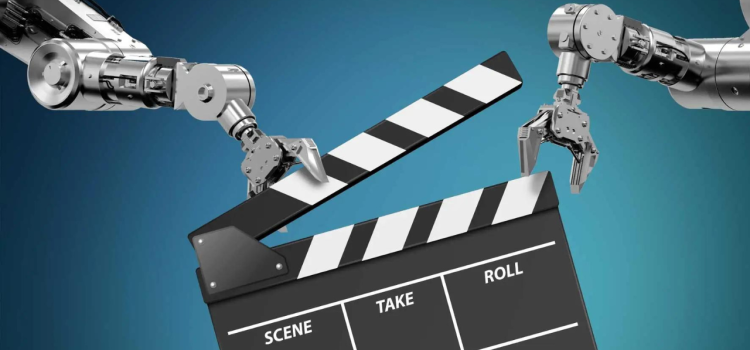
Introduction
The Rise of AI in Filmmaking has been nothing short of revolutionary. As technology continues to evolve, artificial intelligence (AI) is making significant inroads into various sectors, including the entertainment industry. Filmmaking, in particular, is experiencing a paradigm shift that is reshaping traditional methodologies and introducing unprecedented efficiencies and creative possibilities. This article delves into the multifaceted impact of AI on the filmmaking industry, examining how this technological advancement is transforming every aspect of the production process, from pre-production to post-production.
The Advent of AI in Filmmaking
1.Historical Context
The integration of technology in filmmaking is not a new phenomenon. From the advent of sound and color to the use of computer-generated imagery (CGI), each technological leap has pushed the boundaries of what is possible in cinema. However, the Rise of AI in Filmmaking represents a more profound and far-reaching transformation. Unlike previous technologies that primarily enhanced specific aspects of filmmaking, AI has the potential to revolutionize the entire ecosystem.
2.Early Applications
AI’s initial foray into filmmaking was relatively modest, focusing on tasks like script analysis and box office predictions. However, the rapid advancement in machine learning algorithms and computational power has expanded AI’s capabilities, enabling it to perform more complex tasks such as visual effects, editing, and even content creation.
Pre-Production: Streamlining the Creative Process

1.Script writing and Analysis
One of the most time-consuming aspects of filmmaking is script writing. AI-powered tools like Script Book and Deep Story are now capable of analyzing scripts, providing insights into narrative structure, character development, and even predicting box office performance. These tools use natural language processing (NLP) to understand and generate human-like text, offering filmmakers valuable feedback and suggestions.
2.Casting and Talent Management
AI is also making waves in casting and talent management. Platforms like Casting Networks are leveraging AI to match actors with roles based on a myriad of factors, including past performances, physical attributes, and even social media presence. This not only speeds up the casting process but also ensures a more precise fit for each role.
3.Budgeting and Scheduling
AI-driven software like Movie Magic Scheduling and Scenechronize are revolutionizing the logistical aspects of filmmaking. These tools use machine learning algorithms to optimize shooting schedules, manage budgets, and allocate resources efficiently. By automating these tasks, filmmakers can focus more on the creative aspects of their projects.
Production: Enhancing Efficiency and Creativity

1.Cinematography and Camera Work
AI is transforming cinematography by enabling advanced camera automation and real-time analytics. Tools like Arraiy and Shot Hub use computer vision and machine learning to assist in framing shots, adjusting lighting, and even tracking objects. This allows cinematographers to achieve complex shots that would be difficult or impossible to execute manually.
2.Visual Effects
The Rise of AI in Filmmaking is perhaps most evident in the realm of visual effects (VFX). AI-powered tools like Adobe After Effects and DeepArt.io are capable of generating stunning visual effects with minimal human intervention. These tools use deep learning algorithms to analyze footage and create realistic effects, significantly reducing the time and cost associated with traditional VFX techniques.
3.Sound Design
Sound design is another area where AI is making a significant impact. Tools like AIVA (Artificial Intelligence Virtual Artist) are capable of composing original scores, while platforms like Adobe Audition use machine learning to enhance audio quality and remove background noise. These advancements are enabling filmmakers to achieve high-quality soundscapes with greater ease and efficiency.
Post-Production: Revolutionizing Editing and Distribution
1.Video Editing
AI-powered video editing tools like Adobe Premiere Pro and Avid Media Composer are transforming the post-production landscape. These tools use machine learning algorithms to automate tasks like scene detection, color correction, and even editing decisions. By analyzing vast amounts of data, these tools can identify patterns and make recommendations, enabling editors to work more efficiently and creatively.
2.Marketing and Distribution
AI is also playing a crucial role in the marketing and distribution of films. Platforms like Netflix and Amazon Prime Video use AI algorithms to analyze viewer data and make personalized recommendations. This not only enhances the viewer experience but also helps filmmakers reach their target audience more effectively. Additionally, AI-driven marketing tools like IBM Watson are capable of analyzing social media trends and consumer behavior, enabling more targeted and impactful marketing campaigns.
Ethical Considerations and Challenges

1.Job Displacement
One of the most contentious issues surrounding the Rise of AI in Filmmaking is the potential for job displacement. While AI undoubtedly offers numerous benefits, it also poses a threat to traditional roles within the industry. For instance, tasks that once required a team of VFX artists can now be accomplished by a single AI-powered tool. This raises important ethical questions about the future of employment in the filmmaking industry.
2.Creative Control
Another significant concern is the impact of AI on creative control. While AI can assist in various aspects of filmmaking, there is a risk that its over-reliance could stifle creativity. Filmmaking is inherently a human endeavor, driven by emotion and intuition. The challenge lies in striking a balance between leveraging AI’s capabilities and preserving the human touch that defines great cinema.
3.Data Privacy
The use of AI in filmmaking also raises important questions about data privacy. AI algorithms rely on vast amounts of data to function effectively. This includes not only data related to the filmmaking process but also personal data from viewers. Ensuring that this data is collected, stored, and used responsibly is crucial to maintaining trust and integrity within the industry.
The Future of AI in Filmmaking

1.Emerging Technologies
The future of AI in filmmaking looks promising, with numerous emerging technologies poised to further revolutionize the industry. For instance, advancements in generative adversarial networks (GANs) are enabling the creation of hyper-realistic digital characters and environments. Similarly, advancements in natural language processing are paving the way for more sophisticated AI-driven script writing tools.
2.Collaboration Between Humans and AI
The most exciting prospect for the future of filmmaking lies in the potential for collaboration between humans and AI. Rather than viewing AI as a threat, it can be seen as a powerful tool that enhances human creativity and efficiency. By leveraging the strengths of both humans and AI, the filmmaking industry can push the boundaries of what is possible, creating richer, more immersive cinematic experiences.
Conclusion
The Rise of AI in Filmmaking is a transformative force that is reshaping the industry in profound ways. From streamlining pre-production processes to enhancing creativity during production and revolutionizing post-production, AI is making filmmaking more efficient, accessible, and innovative. However, it also presents significant ethical challenges that must be addressed to ensure a sustainable and inclusive future for the industry. As we move forward, the key lies in embracing AI as a tool that complements human creativity, rather than replacing it. By doing so, we can unlock new possibilities and continue to push the boundaries of cinematic storytelling.










